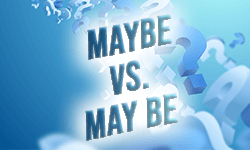
The English language features numerous words that are frequently confused due to similar pronunciation and spelling. This can result in mistakes and can be crucial in academic writing, where selecting appropriate words is vital. Grasping the differences between such commonly confused words is vital for clear and effective communication. In this article, we will compare “maybe” vs. “may be” and show their differences.
Definition of “maybe” vs. “may be”
“Maybe” and “may be” can often be confused, yet they have distinct meanings. The term “maybe” grammatically functions as an adverb, used to express uncertainty or possibility and modify verbs, adjectives, or other adverbs. “May be,” on the other hand, functions as a verb phrase, combining the modal verb “may” with the main verb “be.” It is used to indicate that something could happen, and occasionally, it can be used to express comparison. In the next paragraphs, we will elaborate on their differences through examples and synonyms.
Maybe
May be
…is a verb phrase that consists of the modal verb “may” and the verb “be” and indicates that something is possible.
Due to their similar spelling and pronunciation, both “maybe” and “may be” can be easily confused as their only difference is a short pause between the verbs “may” and “be.” In numerous instances, you can reword a sentence to use “may be” instead of “maybe.” Using them properly is vital for clear communication.
Note: If you can replace the term with “possibly” or “perhaps,” use “maybe.” If you can replace the term with “might be,” use “may be.”
Using the word “maybe”
The word “maybe” is used as an adverb. How it is applied in a sentence will be explained below.
“Maybe“ as an adverb
The adverb “maybe” expresses that something is uncertain, yet has a chance of being true.
Tips for using “maybe” correctly
Alternative expressions for “maybe” avoid repetition and redundancy and improve your language overall. Utilizing them enhances the diversity of your writing and imparts nuance to a language.
| Synonyms | Examples |
| Perhaps | Maybe we should go to the amusement park tomorrow. |
| Perhaps we should go to the amusement park tomorrow. | |
| Possibly | Will it rain tomorrow? Maybe. |
| Will it rain tomorrow? Possibly. |
Using the phrase “may be”
The verb phrase “may be” can be used in various contexts. All of them will be explained below, along with several example sentences.
“May be” as a verb phrase
The verb phrase “may be” expresses a possibility, a potential action, or a comparison.
Tips for using “may be”
Using synonyms for “may be” can improve writing, avoid repetition, and give more variety. Here are alternatives with sample sentences.
| Synonyms | Examples |
| Could be | There may be a problem with the car's engine. |
| There could be a problem with the car's engine. | |
| Might be | She may be at the library studying for her exam. |
| She might be at the library studying for her exam. |
Test yourself!
Practice sheet
To improve your ability to distinguish between “maybe” and “may be,” please fill in the blanks in the given sentences. The solutions for this practice sheet can be found on the second tab.
- _____ we should plan a vacation to the mountains this year.
- There _____ a delay in the delivery due to bad weather.
- Hmm, that _____ true. Actually, _____ that really is true.
- _____ he will change his mind after he hears all the details.
- She _____ working late tonight, so don’t wait up for her.
- The store _____ closed when we get there, so we should hurry.
- _____ she just needs some time to think about it.
- _____ we can go out for dinner after the meeting.
- There _____ a way to solve this problem that we haven’t thought of yet.
- They _____ the best team in the league this season.
- Maybe we should plan a vacation to the mountains this year.
- There may be a delay in the delivery due to bad weather.
- Hmm, that may be true. Actually, maybe that really is true.
- Maybe he will change his mind after he hears all the details.
- She may be working late tonight, so don’t wait up for her.
- The store may be closed when we get there, so we should hurry.
- Maybe she just needs some time to think about it.
- Maybe we can go out for dinner after the meeting.
- There may be a way to solve this problem that we haven’t thought of yet.
- They may be the best team in the league this season.
FAQs
The difference between “maybe” and “may be” is that “maybe” is an adverb, meaning “perhaps,” and “may be” functions as a verb phrase, meaning “might be.”
Both are correct. However, their use depends on the context in which they are being used. “May” indicates a high possibility of something happening, while “might” can indicate a polite suggestion, a hypothetical situation, or an unlikely possibility. Both can be used to ask for permission.
“May” can be used to express possibility, as in:
- It may rain tomorrow.
“May be” can be used to indicate a potential state:
- She may be at home.